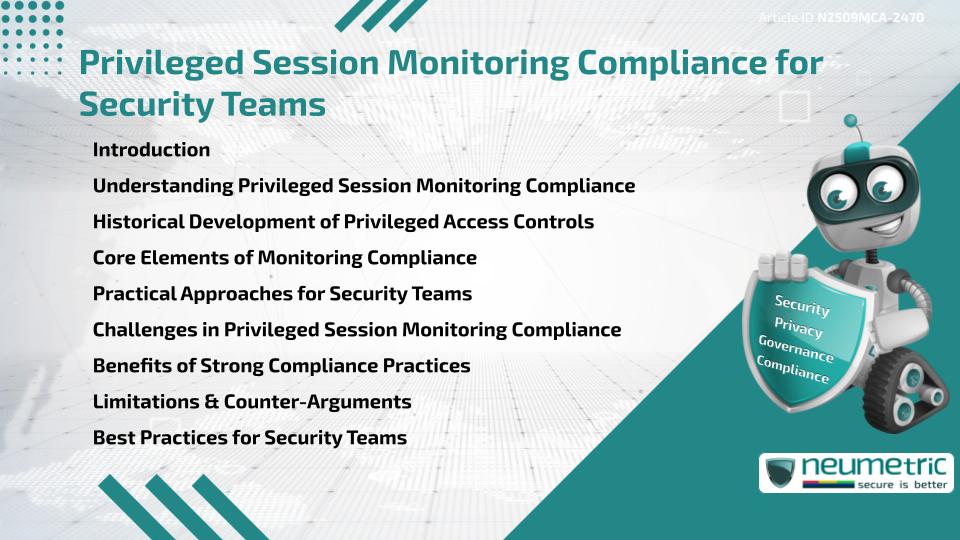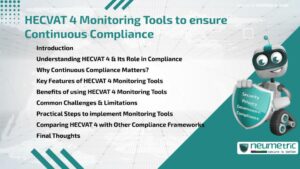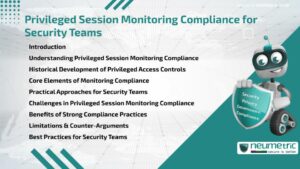Table of Contents
ToggleIntroduction
Privileged Session Monitoring Compliance ensures that activities performed by users with elevated access rights are recorded, monitored & managed in accordance with Security Regulations & Industry Standards. It provides Transparency, Accountability & protection against insider Threats or misuse of privileged accounts.
This article explores the meaning, history, benefits, challenges & Best Practices of Privileged Session Monitoring Compliance. It highlights why Compliance is indispensable for security teams tasked with safeguarding critical systems.
Understanding Privileged Session Monitoring Compliance
At its core, Privileged Session Monitoring Compliance requires organisations to monitor & log sessions where privileged accounts are used. This includes administrators, system operators & contractors who have elevated permissions.
An analogy is surveillance cameras in a secure facility. Just as cameras track who enters restricted areas & what they do inside, Privileged Session Monitoring records activities in critical digital environments to ensure rules are followed.
Historical Development of Privileged Access Controls
The concept of Privileged Access Management emerged in the 1990s as businesses recognised the Risks of shared administrator passwords & unmonitored activities. Initially, simple Audit logs were used, but these lacked visibility into User behaviour.
With the rise of regulatory frameworks in the early 2000s, such as SOX & PCI DSS, more structured Compliance Requirements emerged. Today, Privileged Session Monitoring Compliance is a Standard expectation across industries, supported by advanced tools that capture video-like session replays & real-time alerts.
Core Elements of Monitoring Compliance
Effective Privileged Session Monitoring Compliance involves:
- Comprehensive Logging: Recording all privileged activities with timestamps.
- Real-Time Monitoring: Allowing security teams to detect suspicious behaviour as it happens.
- Access Controls: Ensuring only authorised personnel can initiate privileged sessions.
- Tamper-Proof Storage: Logs must be protected from alteration.
- Audit Readiness: Records should be easily retrievable for Compliance reviews.
Practical Approaches for Security Teams
Security teams can strengthen Compliance through several approaches:
- Deploying Privileged Access Management [PAM] tools with built-in session monitoring.
- Setting up alerts for risky activities such as mass data downloads.
- Conducting regular Reviews of session logs.
- Training staff on Compliance responsibilities.
- Integrating monitoring with Incident Response plans for quick mitigation.
Challenges in Privileged Session Monitoring Compliance
While essential, Privileged Session Monitoring Compliance is not without challenges:
- High Costs: Advanced monitoring solutions require significant investment.
- Data Overload: Managing & analysing large volumes of session data can overwhelm teams.
- Privacy Concerns: Employees may perceive monitoring as intrusive.
- Skill Gaps: Interpreting logs requires trained personnel.
These challenges demonstrate the need for balance between comprehensive monitoring & efficient resource allocation.
Benefits of Strong Compliance Practices
When Privileged Session Monitoring Compliance is properly implemented, security teams gain:
- Enhanced Security: Reduced Risks of insider Threats & external exploitation.
- Regulatory Assurance: Meeting requirements for Audits & Industry Standards.
- Accountability: Clear Evidence of User actions during privileged sessions.
- Incident Response: Faster identification & remediation of suspicious activities.
Limitations & Counter-Arguments
Some argue that Compliance-driven monitoring can lead to excessive focus on record-keeping instead of proactive Threat hunting. Others note that monitoring alone cannot prevent malicious behaviour-it only documents it.
These counterpoints highlight the need for Compliance to be paired with prevention strategies, not treated as a standalone solution.
Best Practices for Security Teams
To improve Privileged Session Monitoring Compliance, security teams should:
- Automate monitoring & alerting processes.
- Use Encryption to protect log data.
- Regularly test & validate Monitoring Tools.
- Align monitoring with broader Compliance frameworks.
- Promote a culture of Transparency & Accountability.
Takeaways
- Privileged Session Monitoring Compliance ensures visibility into high-Risk activities.
- Logs, real-time monitoring & tamper-proof storage are essential.
- Security teams face cost, Privacy & skill challenges.
- Compliance enhances Security, Accountability & Audit readiness.
- Best Practices turn Monitoring into a proactive defence strategy.
FAQ
What is Privileged Session Monitoring Compliance?
It is the practice of monitoring & logging privileged User activities to meet Security & Regulatory requirements.
Why is Compliance important for privileged sessions?
It reduces insider Threats, ensures Accountability & satisfies Regulatory audits.
What are the key elements of monitoring Compliance?
Comprehensive logging, real-time monitoring, Access Controls, tamper-proof storage & Audit readiness.
What challenges do security teams face in Compliance?
Challenges include costs, data overload, Privacy concerns & lack of skilled personnel.
Does Compliance guarantee prevention of Threats?
No, Compliance documents activities but must be combined with preventative Security Measures.
How do PAM tools help with Compliance?
Privileged access management tools provide built-in monitoring, alerts & secure storage of session logs.
Can small teams achieve Privileged Session Monitoring Compliance?
Yes, by adopting scalable PAM solutions, automating processes & focusing on critical systems.
Need help for Security, Privacy, Governance & VAPT?
Neumetric provides organisations the necessary help to achieve their Cybersecurity, Compliance, Governance, Privacy, Certifications & Pentesting needs.
Organisations & Businesses, specifically those which provide SaaS & AI Solutions in the Fintech, BFSI & other regulated sectors, usually need a Cybersecurity Partner for meeting & maintaining the ongoing Security & Privacy needs & requirements of their Enterprise Clients & Privacy conscious Customers.
SOC 2, ISO 27001, ISO 42001, NIST, HIPAA, HECVAT, EU GDPR are some of the Frameworks that are served by Fusion – a SaaS, multimodular, multitenant, centralised, automated, Cybersecurity & Compliance Management system.
Neumetric also provides Expert Services for technical security which covers VAPT for Web Applications, APIs, iOS & Android Mobile Apps, Security Testing for AWS & other Cloud Environments & Cloud Infrastructure & other similar scopes.
Reach out to us by Email or filling out the Contact Form…





